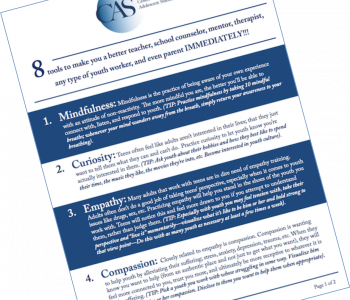

Catharine Hannay, MA
Catharine Hannay is the founder of MindfulTeachers.org and the author of Being You: A Girl’s Guide to Mindfulness, a workbook for teen girls on mindfulness, compassion, and self-acceptance.
5 Tips for Recovering from Burnout and Reconnecting with Your Calling
“Helping others with significant concerns in their lives can be highly effective, satisfying, and meaningful. It can be great work. To do this well […] we must continually invest positively in others, and this means constant renewal of the self and an ongoing focus on the intricate balance between caring for others versus caring for self.”
Thomas Skovholt and Michelle Trotter-Mathison, The Resilient Practitioner
In any of the helping professions, burnout tends to come from a combination of a few different factors:
- Feeling like you have no life outside of work: This is summed up by the French expression “Metro, Boulot [pronounced ‘boo-loh’], Dodo,” which loosely translates as “Commute, Work, Sleep. Repeat.”
- The mind-numbing boredom of doing the same types of tasks and dealing with the same types of problems over and over and over: You’ve just sat through the umpteenth meeting about the same issue that never gets resolved, and now you have to waste even more time and energy on tedious paperwork.
- Lack of appreciation and noticeable impact: In fact, I suspect that the biggest source of burnout in the helping professions is the feeling that what we’re doing isn’t really helping anyone, or isn’t helping nearly enough.
With the understanding that there is much you cannot control, here are a few tips to help you recover from burnout and reconnect with your calling. (Please note that I’m focusing specifically on burnout. In a future post, I’ll address trauma exposure and empathic distress.)
Tip #1: Focus on What Brings You Joy
“The place God calls you to is the place where your deep gladness and the world’s deep hunger meet.”
Frederick Buechner
The goal of avoiding or recovering from burnout isn’t merely to not be bored, but to experience what Francoise Mathieu calls “compassion satisfaction,” the feeling that what you’re doing is fulfilling and worthwhile.
It may be hard to remember sometimes, but you chose this work for a reason. Try to focus your mental energy less on the daily grind and more on what brings you a deep sense of purpose.
For example, one of my friends told me about a 10-hour day of meetings in extreme heat: “It was great!”
My friend is not a masochist who enjoys feeling like he’s going to melt into the furniture. He didn’t mind the uncomfortable conditions because he’s so excited about bringing high-quality educational programs to an underserved community.
Tip #2: Set Reasonable Limits
The biggest obstacle to self-care in the helping professions isn’t lack of knowledge or lack of discipline. It’s lack of time, plus awareness of the needs of other people.
Occasionally you may have to push yourself to the absolute limit, but you can’t do that every single day or even every single year. I once worked on a project for a full 23 hours straight. And I promised myself I would never do that again.
In order to do our work sustainably, Laura van Dernoot Lipsky advises that we each find a reasonable point “between an ethic of martyrdom and ignoring ongoing crises.”
“Many of us might believe, secretly or not so secretly, that our commitment to our work may be measured by our willingness to martyr ourselves. It can be a terrific effort to adopt behaviors or ways of thinking that defy such internal convictions, even when you know the changes are self-respecting, healthy, and entirely necessary.”
(Trauma Stewardship, p. 12)
Joel Charny echoes this sentiment, and explains what helped him cope during a 40-year career as a humanitarian aid worker:
“There’s a martyr complex in the humanitarian sector. The people who burn out are the ones who tend to feel like if they don’t work 15 hours a day today and tomorrow and next week and next month, someone is going to die.
You do everything you can within the boundaries of a working day, then you have dinner, you go to bed and you get up the next day and pick things up. If you do that consistently, you are going to make a difference — without doing harm to yourself.”
(See: “A Retiring Aid Worker Reflects on How to Repair the World without Wearing a Halo”)
Tip # 3: Redefine Success
Several years ago, my family participated in a program that sent books and Girl Scout cookies to military personnel overseas. Most of the boxes went to bases in Iraq and Afghanistan, but one time we were given the address of someone in a remote outpost.
While the postal clerk was weighing our package, I told my husband I was worried that the cookies would be stale by the time they arrived.
“Ma’am, I’m a veteran,” the clerk said. “And trust me, there is no such thing as a stale cookie in a combat zone.”
Ever since then, I’ve used the motto “This is a stale cookie in a combat zone” whenever I need a reminder that:
- I only have control over a limited part of the process; and
- something doesn’t have to be perfect to make a difference.
You you might prefer the motto “Do your best, and let go of the rest.” Or you could quote from T.S. Eliot’s poem Four Quartets: “For us, there is only the trying. The rest is not our business.” I also recommend the song “Planting Seeds” by Nimo Patel (available at Empty Hands Music).
None of us would ever deliberately give anyone stale cookies, either literally or figuratively. But we can only do the best we can with what we’ve got. Just because you’re working under conditions that are far from ideal, that doesn’t mean you can’t bring a little sweetness to someone’s life.
Tip #4: Look for Unconventional Signs of Appreciation
Early in his career, psychologist Christopher Willard worked with a caseload of “angry young men,” including a particularly aggressive boy named Adrian: “When he wasn’t suspended or in custody, he strutted around middle school, shoving classmates and swearing at teachers, but would sit in my office quietly and play with action figures.”
Dr. Willard didn’t realize that he had any impact on Adrian until he announced that he was moving on to another job.
Adrian exclaimed,
“Naw, you can’t leave, Dr. Willard. You can’t leave! I’m gonna go down to your new job and drag you back here to the therapy room, with your head banging on the stairs the whole way up.”
(Growing Up Mindful, p. 54-55)
While that image is alarmingly violent, the sentiment behind it is actually pretty sweet.
They may never say ‘thank you’ in so many words, but it’s likely you’re having a far greater impact on your students, patients, or clients than you realize.
Tip #5: Separate Your Job from Your Calling
If the first four tips don’t work for you, it could be time to consider another job or another line of work:
- You may be ready for new challenges.
- You may not be in the role that’s the best fit for your skills and interests.
- Or, quite frankly, you may be reaching a point where you need health insurance and a livable salary.
Of course ‘you’re not in it for the money,’ but you still need to eat and pay the rent. There’s a pervasive attitude that the intrinsic rewards of working in the helping professions should compensate for not earning a living wage. (This leads to the very odd conclusion that people should only be fairly compensated for work that makes no useful contribution to society.)
I know several people who have corporate jobs and regularly volunteer and make financial contributions to support the causes that are important to them. I also have friends who’ve taken turns with their spouses on who works full-time and who stays home with the kids. There are a lot of options, and the best solution for you will likely evolve over the years.
As Laura van Dernoot Lipsky points out, “the change we see in the world is not tied to any given profession.”
“Each job is only one of millions of tools that can be used to achieve the larger goal. If I am fixing something, and for a while I need to use a hammer, no one will say I am failing if later I pick up a screwdriver. When we undertake a repair we expect to need a whole box of tools. As we work, however, many of us come to think of our jobs as ends in themselves, and not merely as means to institute the changes we seek. We become very attached to doing that exact work at that exact place. We worry that if we stop doing that job (using that tool), we will be forced to give up on the project of repair altogether.”
(Trauma Stewardship, p. 182)
If you feel like it’s time to move on from your current job, you might consider:
- doing the same type of work at a different institution;
- moving into a different role within your current institution; or
- moving into a new field altogether while continuing to serve a similar population.
For example, if your calling is ‘helping inner city youth,’ you could do this as a history teacher, math tutor, school principal, literacy specialist, soccer coach or youth pastor, or as the director of a health clinic or the creator of a community garden. You might even take on several of these roles at different points in your career, some paid and others as a volunteer.
Conclusion
Self-care is only one part of the equation; there is also a need for more reasonable working conditions and a better understanding of the pressures on professional ‘helpers.’ But as I always say, self-care is the one part of the equation that you have complete control over.
I hope these tips help you think about your calling and how to work more sustainably… whether or not you choose to stay in your current job.
The following posts have many more suggestions on how to care for yourself in the midst of your very demanding work serving others:
How Can I Help Others When I’m Struggling Myself?
How Can I Focus on Self-Care When There’s Endless Need?
5 Ways to Practice Self-Care When You’re Exhausted and Overwhelmed

